Filter by
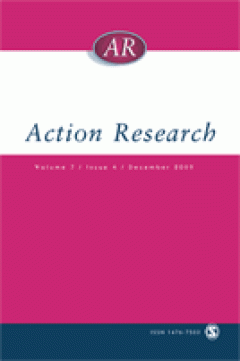
Constructing interorganizational collaboration: The action researcher as boun…
This article aims to explore critically the role of an action research team in the social construction of interorganizational collaboration aimed at transgressing organizational and professional boundaries. We argue that the new relationships, actor conceptions and in some cases forms of work organization arising from the change process have been socially constructed through the discursive inte…
- Edition
- Vol. 8 no. 3, September 2010.pp. 293-314
- ISBN/ISSN
- 14767503
- Collation
- -
- Series Title
- Action Research
- Call Number
- -

Action research as a sustainable endeavor for teachers: Does initial training…
Action research has been recognized as a necessary part of teacher preparation programs. It is assumed that with sufficient training in action research methodology, teachers will continue as action researchers to improve the quality of instruction in their classrooms. Expecting this benefit and outcome, a college in the Middle East requires students to complete one total semester of action rese…
- Edition
- Vol. 8 no. 3, September 2010.pp. 315-332
- ISBN/ISSN
- 14767503
- Collation
- -
- Series Title
- Action Research
- Call Number
- -

Using action research to challenge stereotypes: A case study of boys’ educa…
Action research has a long history of focus on social justice. This article examines such a project, a grant-funded action research project in Australia designed for a group of 14 teachers to study boys� writing and their attitudes about writing. I argue that action research was a crucial methodology to help the participating teachers frame boys� education issues as nuanced and complex from the…
- Edition
- Vol. 8 no. 3, September 2010.pp. 333-356
- ISBN/ISSN
- 14767503
- Collation
- -
- Series Title
- Action Research
- Call Number
- -

Learning Vicariously From Failure: The Case of Major League Soccer and the Co…
Organizations are often encouraged to learn from the failures of others. However, failures can be extremely complicated and multifaceted, defying clear cause attribution. Learning organizations face challenges in adopting and implementing the lessons of such failures and many times are unable to appropriately correct the root causes. Using a grounded theory approach, the authors present a learn…
- Edition
- Vol. 35 no. 5, October 2010.pp. 542-571
- ISBN/ISSN
- 10596011
- Collation
- -
- Series Title
- Group Organization Management
- Call Number
- -

Policy and Practice: Recursive Learning From Crisis
Data from the 2007 U.K. floods are examined using institutional theory and practice theory lenses. We note that learning from crisis ultimately results in �lessons learned� being institutionalized in new norms, tools, and infrastructure. As the basis of legitimate action for coping in the future, they may provide a measure of resilience, but crisis management and recovery is an active and emerg…
- Edition
- Vol. 35 no. 5, October 2010.pp. 572-605
- ISBN/ISSN
- 10596011
- Collation
- -
- Series Title
- Group Organization Management
- Call Number
- -

Why Do Product-Market Strategies Fail? A Sociostructural Examination Under Co…
The authors contend that structural and managerial antecedents of strategy failure exist and the extent to which these determine failure is different under conditions of high and low adherence to strategy. Our results support these arguments and demonstrate that the drivers of failure differ according to the unusual strategy process environment of both types of firms. Resource scarcity is found…
- Edition
- Vol. 35 no. 5, October 2010.pp. 606-635
- ISBN/ISSN
- 10596011
- Collation
- -
- Series Title
- Group Organization Management
- Call Number
- -

The Protracted Collapse of Ghana Airways: Lessons in Organizational Failure
Although the importance of organizational failure has fostered a steady stream of research, a review of the literature suggests that the majority of studies have focused on firms in the private sector and in developed economies. Despite the increasing occurrence of state-owned firms failing in many developing countries, empirical research on this issue remains scant. Using an in-depth case stud…
- Edition
- Vol. 35 no. 5, October 2010.pp. 636-665
- ISBN/ISSN
- 10596011
- Collation
- -
- Series Title
- Group Organization Management
- Call Number
- -

Antecedents of Failure for Newly Chartered Banks in the U.S. Banking Industry
In the United States, newly chartered banks are subject to increased regulatory scrutiny during their early years of operation to ensure their long-term viability. As the record number of bank failures in 2009 has shown, this additional regulation does not guarantee success. To better understand the internal factors in this environment that result in organizational distress, an antecedent failu…
- Edition
- Vol. 35 no. 5, October 2010.pp. 666-695
- ISBN/ISSN
- 10596011
- Collation
- -
- Series Title
- Group Organization Management
- Call Number
- -
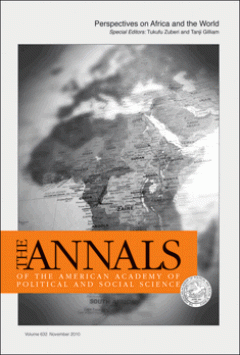
The Ogaden War and the Demise of Détente
The failure of d�tente has been a popular theme among historians of American foreign policy, with opinions divided as to where the responsibility for this failure lies. A commonality among all points of view, however, is the importance of events in the third world, particularly in the �Arc of Crisis.� One such event�the Ogaden War between Ethiopia and Somalia� prompted Zbigniew Brzezinski, Pres…
- Edition
- Vol. 632 no. 1, November 2010.pp. 26-40
- ISBN/ISSN
- 00027162
- Collation
- -
- Series Title
- The ANNALS of the American Academy of Political and Social Science
- Call Number
- -
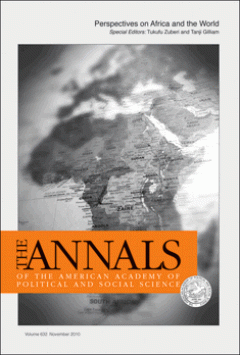
Black Africans in World War II: The Soldiers’ Stories
This article discusses the often forgotten contributions of black African infantry to the French and British war efforts from Europe to Asia during the Second World War. It traces the relationship between black African soldiers and their imperial rulers as it evolved over the course of two global conflicts from 1914 to 1945. The article points out how racist preconceptions about the �inferior� …
- Edition
- Vol. 632 no. 1, November 2010.pp. 12-25
- ISBN/ISSN
- 00027162
- Collation
- -
- Series Title
- The ANNALS of the American Academy of Political and Social Science
- Call Number
- -

Decolonization or National Liberation: Debating the End of British Colonial R…
When discussing the end of British colonial rule in Africa, many historians have highlighted the role of postwar international relations and the impact of domestic imperial politics on decolonization and have failed to recognize the role of African nationalists. This article argues that such a viewpoint is flawed because it conceives of colonial policy makers as isolated and autonomous entities…
- Edition
- Vol. 632 no. 1, November 2010.pp. 41-54
- ISBN/ISSN
- 00027162
- Collation
- -
- Series Title
- The ANNALS of the American Academy of Political and Social Science
- Call Number
- -

Radical Islam in East Africa
Islam has a 1,000-year history in West Africa; in East Africa it is even longer. What started out as liberating efforts by Muslims in Africa degenerated into oppressive regimes over time. Over the centuries, conquest increasingly came to define Islam�s approach in Africa. How Africa manages its necessity to accommodate Islamic elements in its midst is one of the continent�s most daunting challe…
- Edition
- Vol. 632 no. 1, November 2010.pp. 55-66
- ISBN/ISSN
- 00027162
- Collation
- -
- Series Title
- The ANNALS of the American Academy of Political and Social Science
- Call Number
- -

Debating Darfur in the World
This article compares the debates and demonstrations about Darfur that have taken place in the Sudan, the United States, and Qatar and illuminates how political violence is apprehended and cultural identities are constructed. The rallies that occurred among Sudanese inside and outside the Sudan following the 2009 indictment of President Omar Hassan al-Bashir by the International Criminal Court …
- Edition
- Vol. 632 no. 1, November 2010.pp. 67-85
- ISBN/ISSN
- 00027162
- Collation
- -
- Series Title
- The ANNALS of the American Academy of Political and Social Science
- Call Number
- -

The United States of Africa: A Revisit
Pan-Africanism was developed over the late nineteenth and early twentieth centuries to combat the political subjugation of black people and the vestiges of slavery. Its founding belief is that black peoples share common cultures, problems, and objectives. It was, therefore, imperative for blacks to unite to achieve their objectives. On the African continent, Pan-Africanism became the rallying c…
- Edition
- Vol. 632 no. 1, November 2010.pp. 86-102
- ISBN/ISSN
- 00027162
- Collation
- -
- Series Title
- The ANNALS of the American Academy of Political and Social Science
- Call Number
- -

Afrocentricity and the Argument for Civic Commitment: Ideology and Citizenshi…
This article discusses an ideological framework, that is, a superstructure for continental civic commitment to African nationalism based on the perceived and practical relationships of Africans with each other. In an attempt to minimize the threats of regional, religious, or ethnic obstacles to continental integration and civic commitment to the continent, the author proposes both intellectual …
- Edition
- Vol. 632 no. 1, November 2010.pp. 121-131
- ISBN/ISSN
- 00027162
- Collation
- -
- Series Title
- The ANNALS of the American Academy of Political and Social Science
- Call Number
- -
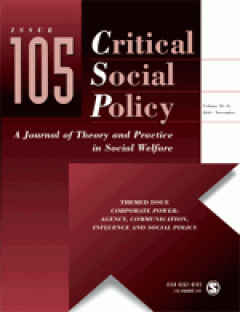
Introduction to the themed issue. Corporate power: Agency, communication, inf…
This paper introduces this themed issue of Critical Social Policy on the question of corporate power. Corporate power is recognized as an important agent in social policy making and delivery. However, to date there has been comparatively little attention to the crucial role that lobbying and corporate �spin� play in helping to shape policy making contexts. This special issue of Critical Social…
- Edition
- Vol. 30 no. 4, November 2010.pp. 459-471
- ISBN/ISSN
- 02610183
- Collation
- -
- Series Title
- Critical Social Policy
- Call Number
- -
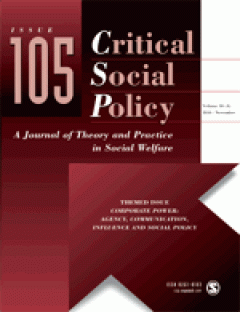
Capitalist globalization, corporate social responsibility and social policy
This article outlines how the twin crises of capitalist globalization � of class polarization and ecological unsustainability � combine to produce the need for Corporate Social Responsibility (CSR) to attempt to bridge the gap between the rhetoric and reality of corporate conduct. The first section outlines how CSR relates to capitalist globalization and how it is integrated into the activities…
- Edition
- Vol. 30 no. 4, November 2010.pp. 472-495
- ISBN/ISSN
- 02610183
- Collation
- -
- Series Title
- Critical Social Policy
- Call Number
- -

Business-managed democracy: The trade agenda
The architecture of global governance that has emerged in the past two decades has been strongly influenced by transnational policy actors. This article examines the role of transnational corporate agency in social policy by focusing in particular on the role of business coalitions, elite networking bodies and policy planning groups in fostering unity amongst corporate actors and enrolling poli…
- Edition
- Vol. 30 no. 4, November 2010.pp. 496-518
- ISBN/ISSN
- 02610183
- Collation
- -
- Series Title
- Critical Social Policy
- Call Number
- -

Corporate and political strategy in relation to the Private Finance Initiativ…
The Private Finance Initiative (PFI) allows corporations to access guaranteed flows of public funds in exchange for the use of new facilities and the provision of asset-based services such as maintenance and estates management. The policy has been developed in the UK since 1992 and has been applied in fields of social policy analysis: notably, health and education. PFI has been a difficult poli…
- Edition
- Vol. 30 no. 4, November 2010.pp. 519-540
- ISBN/ISSN
- 02610183
- Collation
- -
- Series Title
- Critical Social Policy
- Call Number
- -

Forging a ‘neoliberal pedagogy’: The ‘enterprising education’ agenda …
New Labour came to power with a stated commitment to �education, education, education� and confirmed quickly that this commitment included a greater role for business in the modernization of state schools. One important, yet under-researched, element of direct business involvement is in school pupils� personal and academic development evident in the increasingly pervasive embedding of rhetoric …
- Edition
- Vol. 30 no. 4, November 2010.pp. 541-563
- ISBN/ISSN
- 02610183
- Collation
- -
- Series Title
- Critical Social Policy
- Call Number
- -
 Computer Science, Information & General Works
Computer Science, Information & General Works  Philosophy & Psychology
Philosophy & Psychology  Religion
Religion  Social Sciences
Social Sciences  Language
Language  Pure Science
Pure Science  Applied Sciences
Applied Sciences  Art & Recreation
Art & Recreation  Literature
Literature  History & Geography
History & Geography